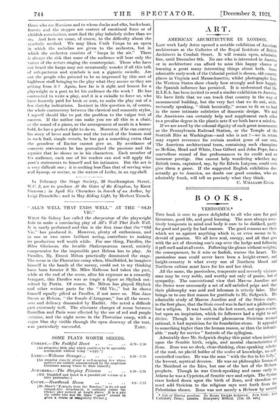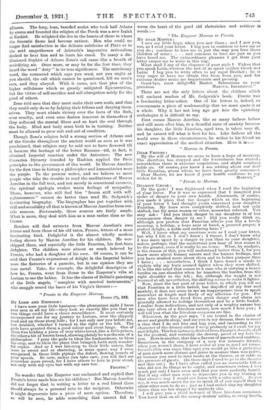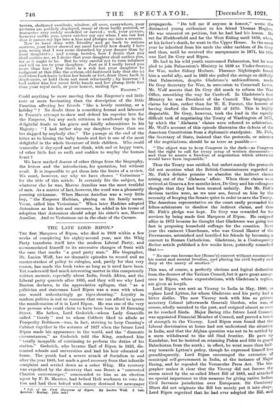BOOKS.
VERISSIMUS.*
Tim book is sure to prove delightful to all who care for good literature, good life, and good learning. The man always asser- tively temperate in mind and body is sure to be disliked, partly for good and partly for bad reasons. The good reasons arc those which set us against anything which is, or even seems to be, devoid of passion. We all love zeal, energy, and all that goes with the act of throwing one's cap over the hedge and following it pell-mell and at all costs. Following the gleam without weighing the consequences, be it wise or foolish, warms the heart. The passionless man could never have been a knight-errant, and knight-errantry is what every one of Northern blood and Northern culture must have for his and her ideal.
All the same, the passionless, temperate and severely virtuous man may be very noble, and worthy not only of praise, but of sympathy. The conventional view that Marcus Aurelius and the Stoics were necessarily a set of self-satisfied prigs and that their philosophy was arid and inhuman is utterly false. That brings us to our first reason for gratitude to Mr. Sedgwick. His admirable study of Marcus Aurelius and of the Stoics shows, in the first place, that the Stoic creed was in fact not a philosophy: but a religion. It was based, in the last resort, not upon reason, but upon an inspiration, which its followers had a right to call divine. Though in its external phenomena Stoicism seemed rational, it had mysticism for its foundation-stone. It appealed to something higher than the human reason, or than the indomit- able " ready for service " footrule of the syllogism. Admirably does Mr. Sedgwick display this point when insisting upon the Semitic birth, origin, and mental characteristics of Zeno. Zeno was no sleek, clear-thinking, clear-speaking scholar of the soul, no placid, holder of the scales of knowledge, no self- controlled teacher. He was the man " with the fire in his belly,' the fervent, mystical devotee. He was no philosophic Ionian of the Mainland or the Isles, but one of the last of the Hebrew prophets. Though he was Greek-speaking and came early to Athens he was a Cypriote, of Semitic race and origin. The Syrian stars looked down upon the birth of Zeno, and therefore we must add Stoicism to the religious rays sent forth from the Palestinian shores. Zeno was not merely a Hebrew by mental • Life of Marcus Aurelius. By Henry Dwight Sedgwiek. New York: University Press; London Humphrey- 1111ford. [lia t3d. net.]
alliance. The long, lean, bearded zealot who took half Athens by storm and founded the religion of the Porch was a new Isaiah
or Ezekiel. He relighted the fire in the hearts of those in whom the Socratic flame had become extinct. Men who could no longer find satisfaction in the delicate subtleties of Plato or in the arid magnificence of Aristotle's imperative rationalism flocked to hear him and to learn his creed. To many a dis- illusioned Sophist of Athens Zeno's call came like a breath of revivifying air. Once more, or may be for the first time, they heard the word " duty " in its true significance. The mandatory word, the command which says you must, not you ought or you should, the call which cannot be questioned, fell on men's ears, and they obeyed. With it came, not that plea of the higher selfishness which so greatly mitigated Epicureanism, but the virtue of self-sacrifice and self-abnegation solely for the good of others.
Zeno told men that they must make their own souls, and that they could only do so by helping their fellows and denying them- selves. They must obtain victory over the lusts of the flesh, over cruelty, and even over desires innocent in themselves if they softened the mental fibres and so hurt the soul through the body. Mind and body must both be in training. Neither must be allowed to grow soft and out of condition.
Though Zeno's religion held a strong section of Athens and of the Greeks throughout the ancient world as soon as it was proclaimed, that religion may be said not to have flowered till it became the heritage of the better Romans—till, in fact, it obtained Imperial sanction under the Antonines. The new Caesarian Dynasty founded by Hadrian applied the Stoic principles to the government of the world. In Marcus Aurelius for the first time in history a philosopher and humanitarian wore the purple. To tho present writer, and wo believe to most people who take the trouble to read the meditations of Marcus Aurelius in the full text, and not merely in sensational extracts, the spiritual apologia evokes warm feelings of sympathy. Those, however, who still find him " frozen stiff with self- righteousness " cannot do better than read Mr. Sedgwick's fascinating biography. The biographer has put together with skill and sensibility all that is known of Marcus Aurelius from out- side sources. Fortunately, these sources are fairly ample. What is more, they deal with him as a man rather than as the Caesar.
Readers will find extracts from Marcus Aurelius's own letters and from those of his old tutor, Fronto, letters of a most fascinating kind. Delightful is the almost wholly modern feeling shown by Marcus Aurelius for his children. He wor- shipped them, and especially the little Faustina, his first-born dafighter. The children were almost as much beloved by Fronto, who had a daughter of his own. Of course, it can be said that Fronto's expressions of delight in the Imperial babies were the flatteries of a parasite, but in our opinion they are true metal. Take, for example, the delightful description of how he, Fronto, went from Rome to the Emperor's villa at Lorium to see the babies. It has the charm of Bellini's paintings of the little angels, " complete with musical instruments," who snuggle round the bases of his Virgin's thrones :—
" Fronto to the Emperor Marcus.
Rome (,), 163.
MY LORD AND EMPEROR
I have seen your little bantams—the pleasantest sight I have ever seen in all my life—they look so exactly like you that no two things could have a closer resemblance. It most certainly recompensed me for my journey to Lorium, over the slippery road and up those steep hills ; for I not only saw you before me, but doubled, whether I turned to the right or the left. The gods have granted them a good colour and stout lungs. One of them was holding a piece of very white bread, like a little prince, the other a bit of brown bread, showing plainly he was the son of a Philosopher. I pray the gods to bless the husbandman, to bless the crop, and to bless the plant that bringeth forth such wonder- ful copies. And as I was listening to their little voices, that were so sweet and so charming, in some queer way I even recognized in those little pipings the dulcet, flowing sounds of Your speech. So now, unless you take care, you will find me somewhat more proud, for I have others to love in your stead, not only with my eyes but with my ears too.
FRONTO."
NO wonder that the Emperor was enchanted and replied that Pronto's letter made him see his children ! But Marcus Aurelius did not forget that in writing a letter to a real friend there should always be a personal note to the recipient. Otherwise it might degenerate into a piece of mere egoism. Therefore, as will be seen, he adds something that cannot fail to
warm the heart of the good old rhetorician and artificer in words :—
"The Emperor Marcus to Fronto. MY DEAR MASTER:
I saw my little boys, when you saw them ; and I saw you too, as I read your letter. I beg you to continue to love mo as you do ; continuo to love me in just the way you love those children of mine : . . . and continuo to love me just as you have loved me. The extraordinary pleasure I get from your letter causes me to write in this way. What shall I say of the elegance of your style ? Unless that you speak Latin, whereas the rest of us speak neither Greek nor Latin. I beg you to write often to my royal Brother ; ho is very eager to have me obtain this boon from you, and his extreme desires make me importunate and pressing.
Good-bye, most delightful Master. Salutations to your
grandson. MARCUS, IMPERATOR."
These aro not the only letters about the children which will enchant readers of Mr. Sedgwick's book. Front* was a fascinating letter-writer. One of his letters is, indeed, so consummate a piece of workmanship that we must quote it as a whole. Why it has not long ago got into the epistolary anthologies it is difficult to say.
First comes Marcus Aurelius, like so many fathers before and still more after him, in a dreadful state of anxiety because his daughter, the little Faustina, aged two, is taken very ill, and he cannot tell what is best for her Like fathers all the world over in these circumstances, ho writes to his friend an exact appreciation of the medical situation. Here it is "Marcus to Fronto.
DEAR Faorrro
By the will of Heaven we seem to have a hope of recovery. Tho diarrheas has stopped and the feverishness has abated ; nevertheless there is extreme emaciation, and slight coughing holds on. Of course, you know I am writing about our dear little Faustina, about whom we have been greatly concerned.
Dear Master, let mo know if your health conforms to my wishes for it. Marcus." " Fronto to Marcus.
DEAREST CESAR :
By the gods I was frightened when I read tho beginning of your letter. For it was so expressed that I imagined you spoke of danger to your own health. Afterwards, of course, you made it plain that the danger which at the beginning of your letter I had thought yours concerned your daughter Faustina. My fears were completely shifted, and not only shifted, but for some reason or other, somewhat relieved. You may ask : Did you think danger to my daughter is of less consequence than danger to me ? Did you really think so, although you profess that Faustina affects you like a lovely morning, a holiday, a hope near at hand, a granted prayer, a perfect delight, a noble and enduring fame ? ' Well, I know what my emotions wore as I read your letter, but why I felt so I don't know ; I repeat, I don't know why I was more upset by a danger to you than to your daughter, unless, perhaps, that the misfortune you hear of fast seems to be the greater, even if it really be no worse. What, by analysis, is the reason of this, you will understand better than I, for you know more about human nature and the human feelings, and you have studied more about them and to better purpose than I have ; . . . nevertheless, I think I have found a simile to explain why my fears seemed lighter when they wore shifted. It is like the relief that comes to a man who is carrying a heavy burden on one shoulder when ho transfers the burden from the right shoulder to the left ; for, although tho weight is not lessened at all, nevertheless, the shifting seems to make it lighter.
Now, since the last part of your letter, in which you toll me that Faustina is a little better, has dispelled all my fear and anxiety, it does not seem to me an inappropriate time to speak somewhat at length and freely of my affection for you. For men who have been freed from great danger and alarm are generally allowed to indulge themselves and be a little foolish. I realize from indications, and not only of a weighty nature but also very often of a frivolous nature, how much I love you ; I will tell you what the frivolous occasions are like. Whenever, as the poet says, I am bound in the chains of sweet and gentle sleep,' and see you in my dreams, there is never a time that I do not kiss and hug you, and (according to the character of the dream) either I weep profusely or I exult for joy and delight. This last instance, derived from Ennius's Annals, she) l be tho poetical, and certainly the drowsy, proof of my love for you. Here is another, that has a flavour of quarrels and scolding. Sometimes, in the company of a very few intimate friends, when you weren't there, I have railed at you in good set terms, because (this was somo time ago) you would go into a gathering of men much more distant and grave in manner than was polite, s'ar because you used to read books at the theatre, or at table in the presence of guests. (In those days I used to go to tho theatre and dine out.) So I have often called you an unsociable fellow who did not do things as he ought, and sometimes (when I was much put out) I have oven said that you wore perfectly horrid.
But if any other man were to depreciate you in my hearing in that abusive way I would not listen with a calm spirit. As you see, it was much easier for me to speak ill of you myself than to allow other men to do so ; just as I had rather slap my daughter Grace than see her slapped by anybody' else.
I will give you a third instance of these frivolous occasions. You know that on all the money-dealers' tables, in every booth.
tavern, sheltered vestibule, window, all over, everywhere, your pictures are publicly displayed, many of them badly painted, or statuettes very rudely modelled or carved ; well, your picture, however unlike you, never catches my eye when I am out but that it purses my lips into a kiss and plunges me into a reverie. Now to have done with frivolity and go back to serious matters, your letter showed me most forcibly how dearly I love you, seeing that I was more disturbed by your danger than by your daughter's ; and seeing, besides, how I desire that you shall outlive me, as I desire that your daughter shall outlive you, for so it ought to be. But be very careful not to turn informer and toll on me to your daughter. Just as if I really loved you moro than her ! For there is a risk lest your daughter be indignant at this (like the serious, old-fashioned lady that she is) and when I ask leave to kiss her hands or feet, draw them back in displeasure, or hold them out most reluctantly ; by heavens ! I had rather kiss her sweet little hands and her plump little feet than your royal neck, or your honest, smiling lips.
FRONTO."
Could anything be more moving than the Emperor's sad little note or more fascinating than the description of the little Faustina affecting her friends " like a lovely morning, or a holiday " ? No doubt there is something formal and laboured in Fronto's attempt to show and defend his superior love for the Emperor, but any such criticism is swallowed up in the delightful finale to his grave and kindly admonitions to his Majesty : " I had rather slap my daughter Grace than see her slapped by anybody else." The passage at the end of the letter as to kissing the baby hands and feet is one of the most delightful in the whole literature of little children. Who could transcribe it dry-eyed and not think, with sad or happy tears, of other little feet so swift and sudden to waylay the human heart ?
We have marked dozens of other things from the biography, the letters and the introduction, for quotation, but without avail. It is impossible to get them into the limits of a review. We must, however, say why we have chosen " Verissimus " for the title of this article. It certainly fits the subject, for whatever else he was, Marcus Aurelius was the most truthful of men. As a matter of fact, however, the word was a pleasantly punning nickname. When Marcus Aurelius was a very little boy, " the Emperor Hadrian, playing on his family name, Verus, called him Verissimus." When later Hadrian adopted Antoninus as his heir and successor, he added in his terms of adoption that Antoninus should adopt his sister's son, Marcus Aurelius. And so Verissimus sat in the chair of the Caesars.












































 Previous page
Previous page